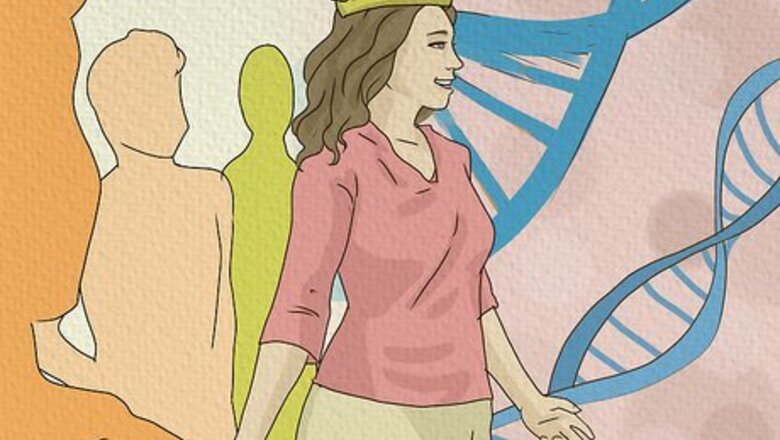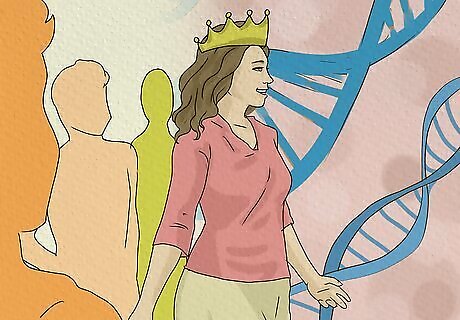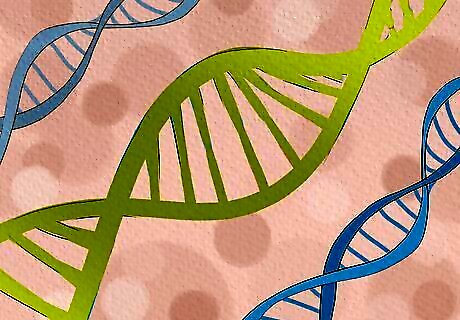
views
- Most research suggests that narcissism is a complex condition caused by a combination of genetic, hereditary, and environmental causes.
- Someone is more likely to develop narcissism if they’re traumatized or abused as a child.
- Parents can minimize the odds their child develops narcissism by enforcing consequences and showing affection.
Is narcissism inherited or learned?

It’s complex, but narcissism is probably a combination of nature and nurture. Like most mental/emotional issues, narcissism is most likely partially inherited and partially environmental. Based on decades of research, narcissism appears to be a spectrum. On the lower end, it can be a mild personality trait that occasionally ruffles feathers and makes relationships difficult. On the more extreme end, it can be a full-blown personality disorder. Narcissism personality disorder first develops when someone is in their late teens or early 20s, which may indicate narcissism requires childhood experiences to develop. One study on twins demonstrated that if one child had narcissistic personality disorder, there was a 77% chance the other twin would have the condition. This could point towards a major hereditary component. Regardless of the view you take, narcissists don’t choose to be the way they are. They were either born that way, or created that way when they were very young.
Risk Factors for Narcissism

Childhood trauma There’s a high correlation between experiencing traumatic events in childhood and developing narcissism as an adult. It’s likely that narcissism is a maladaptive coping strategy to things like physical abuse, violence, or loss of a loved one. Maladaptive behavior refers to any adaptation someone makes that harms their well-being (like anxiety, depression, or narcissism). The adaptive version of narcissism is high self-esteem. For example, if a child is physically abused when they’re young, the maladaptive response may be fear which develops into a narcissistic need for reassurance later in life.

Parental treatment A parent’s treatment of their child accounts for a lot when it comes to their personality as an adult. If a parent goes out of their way to make a child feel better than everyone, or if they’re so cruel and selfish that they neglect their child, they’re increasing the odds that their child develops narcissism later in life. There are actually two variations of narcissism: grandiose, where the person thinks they’re better than everyone, and vulnerable, where the person is scared nobody thinks they’re good at anything. As an example, neglect and abuse may create a vulnerable narcissist, while a parent who treats their child like they can do no wrong is more likely to create a grandiose narcissist.

Inherited characteristics If both of your parents are narcissistic, you’re much more likely to develop NPD later in life. While your personality isn’t fixed by any means and anyone can make a serious attempt to be a better person, there is a chunk of who you are that was given to you. It’s the same way someone might naturally be shy, or extroverted, or funny even without trying to be. Whether you view this as being genetic or learned behavior, the core point is that some narcissists are just naturally that way.

Gene mutations There are some studies out there that indicate there could be a genetic malfunction that contributes to the development of narcissistic personality disorder. The same way there appears to be an alcoholic gene and a gambling gene, there very well could be a narcissistic gene. One study found that people with NPD may have a genetic disorder that increases levels of oxidative stress in their blood. This is also a marker for interpersonal sensitivity, so perhaps there is an “extreme personal reaction” gene.

Living in an individualist country You’re more likely to develop narcissism if you grow up in a culture that puts a lot of value in individual freedom and expression, and less likely to develop narcissism if you grow up in a culture where family and community are more heavily emphasized. As a whole, you’re probably less likely to run into a narcissist if you go to Asia, South America, or the Nordic countries, and more likely to find a narcissist in North America and Western Europe. With that said, parental upbringings aren’t universal. It’s possible for a hyper-individualistic family to raise a narcissist in Asia and for a community-focused family to raise a non-narcissist in North America.
What kind of upbringing creates a narcissist?

Narcissists often grew up with a parent who overvalued them. If a child is taught that they can do no wrong, they never have to apologize, and they’re encouraged to believe that they deserve things without earning them, it’s possible that they’ll develop NPD later in life. As an example, if a child starts a fight in school and their teacher calls their parents, the parents are overvaluing their child in an unhealthy way if they take their kid’s side and don’t punish them. Parent overvaluation is more likely to create a grandiose narcissist than a vulnerable narcissist. Overvaluation is in contrast to parental warmth, where a parent expresses appreciation and affection but enforces boundaries and consequences, which is a healthy way to create a well-adjusted child with high self-esteem.

Narcissists may have learned that selfishness was rewarded. If someone grows up being rewarded for lying, taking things from other people, or ignoring people in need, they may internalize a kind of narcissism as they get older. In an extreme form, this kind of narcissism may develop into (or express comorbidity with) sociopathy. For example, let’s say a child steals candy and their parent catches them. The child lies and says they found it. If the parent doesn’t punish their child, even though they know they’re probably lying, it can encourage future selfishness.

Narcissists were potentially neglected or ignored. If a child doesn’t get the care or affection they need when they’re young, they may start acting out to get the attention they need. If they’re rewarded with that attention, it can create a loop where the child acts out more and more. This can develop into narcissism when they get older. Say a child is ignored at home. So, they go to school and talk in class often enough that the teacher responds to them. For that child, this attention will replace whatever they’re missing and they’ll continue to act out.
Signs You’re in a Relationship with a Narcissist

They think they’re better or more important than others. If you’re dating a narcissist, you’ll probably get the vibe that they’re super into themselves. They’re going to prioritize their needs over yours, and steer conversations towards what they want. You may even notice they treat service workers poorly, or that they always blame the failures of others instead of taking responsibility. For the grandiose narcissist, they think they’re so special that it’s impossible other people deserve as much praise or attention. Vulnerable narcissists are so insecure that they need to behave like they’re special to convince everyone around them.

They fly into a rage when they receive negative feedback. Deep down, narcissists are extremely fragile. There’s always that little voice in the back of their head telling them that they aren’t all that special or unique, so if someone questions them, it can make them extremely angry. Narcissist rage can be scary, intense, and dramatic. In its most extreme form, a narcissist in a state of rage can be physically or emotionally abusive. Never put up with abuse and don’t accept any rationalizations. If you need help, don’t hesitate to reach out to a friend, family member, or even law enforcement to get out of the relationship.

They’re prone to envy others while thinking other people envy them. Narcissists tend to spend a lot of time fixating on how they can acquire more attention, money, or items. At the same time, they’ll likely assume that everyone else is envious of them because of how awesome and special they are. You may even notice that they downplay your accomplishments or try to play it off like they’ve got a better version of whatever you’ve just acquired.

They frequently brag and they easily lose perspective. If you love hearing about how awesome your partner is, you just might enjoy being with a narcissist. Narcissists will spend an unusual amount of time talking about how awesome they are. In fact, they may spend so much time focusing on how much they’ve achieved that they won’t even notice it if you do something worth celebrating. This is also why narcissists often seem so cold-hearted. They think they’re better than everyone else so they don’t behave empathetically, and they’re so focused on their accomplishments that they don’t notice others doing well.

They make you feel less important than you actually are. One of the biggest signs that you’re dating a narcissist is that you feel like you aren’t getting your needs met and you start questioning your self-esteem. Narcissists are masters at keeping the attention on them, and it can be draining and upsetting to be around them in the long run. You have no responsibility to rehabilitate a narcissist. If you don’t feel valued in your relationship, there’s nothing wrong with breaking up with them. In extreme cases, they may even gaslight you into thinking you’re the one who has a problem.
Treatment for NPD

The only known treatment for NPD is psychotherapy. You cannot technically cure narcissistic personality disorder, but it can be managed and treated with talk therapy. In therapy, a narcissist can learn how to recognize their own shortcomings, manage personal relationships, and challenge personal issues with self-esteem and attention. They’ll also learn how to heal from past traumas and process what they’ve experienced. Unfortunately, there are no medications designed or approved for narcissistic personality disorder.



















Comments
0 comment